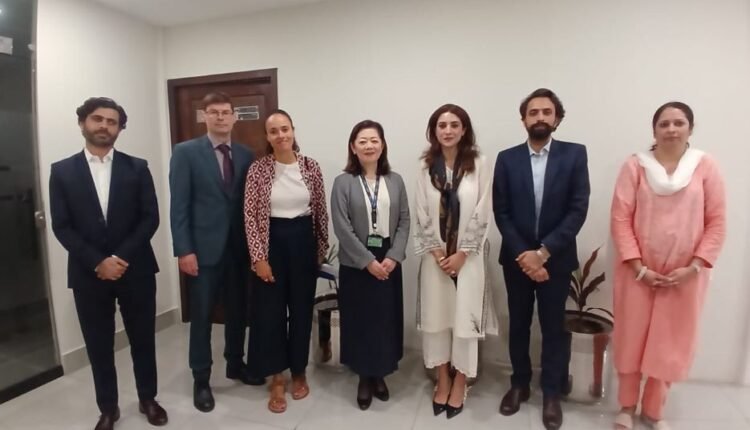Islamabad: A meeting of the Advisor to the Honorable Chairman Senate on Special Initiatives, Ms. Rida Qazi, with the International Organization for Migration (IOM) and representatives of the United Nations was held today at the Senate Secretariat, Block C. The delegation included Ms. Mio Sato, Chief of Mission, Mr. Darijus Pamparas, Senior Program Manager, Ms. Laetita Vaval, Program Support Coordinator, and Mr. Adresh Laghari, National Communications Officer.
Welcoming the UN delegation, Ms. Rida Qazi noted that the establishment of the Special Initiatives Wing is one of the first steps toward realizing the vision of the Honorable Chairman Senate of Pakistan to build a people-centric Parliament. She emphasized that this new orientation strengthens the Senate’s constitutional role by aligning international partnerships with national and regional priorities, while ensuring that parliamentary action reflects the aspirations and needs of the people.
She underlined that the role of Parliament in migration governance must go beyond oversight and legislation, serving as a driving force in shaping policies that address emerging challenges and opportunities in mobility. Parliamentarians, through Standing Committees and structured diplomacy, can integrate migration into development policies, advance the Sustainable Development Goals, and ensure that governance mechanisms remain people-oriented, inclusive, and responsive.
Ms. Qazi further highlighted that the shift from an ad hoc approach to a structured framework enhances accountability by reviewing the performance of enforcement agencies, informing legislation, and strengthening oversight. She added that Standing Committees are well-placed to mainstream policies and frameworks on migration within their mandates, creating synergies between global commitments and domestic policy. Moreover, to carry forward the agenda of migration governance effectively, a parliamentary task force has been proposed.
She also emphasized the vital role of the Pakistani diaspora, whose contributions through remittances remain the backbone of the economy. She reiterated that the Senate views legal migration positively and is committed to facilitating opportunities for Pakistanis abroad through structured parliamentary diplomacy and international engagement.
The meeting underscored the significance of migration diplomacy and discussed the establishment of a joint framework to address migration challenges through cooperative and institutional mechanisms. UN representatives welcomed the initiative, stressing that migration must be treated as a diplomatic priority rather than solely a labor or development issue. They also highlighted the rising challenge of climate-induced migration, noting the need to integrate mobility linked to floods, health, and climate change into the broader work plan. The UN side affirmed that expertise and programs already exist in this area, creating strong entry points for expanded cooperation with Pakistan.
On the issue of resources, the UN representatives observed that while funding gaps remain a constraint, the willingness to support Pakistan has not diminished. They encouraged exploring non-traditional and innovative funding avenues, including climate finance and partnerships with emerging donors, where parliamentary diplomacy can play a crucial role in convening dialogues and unlocking opportunities.
Both sides reaffirmed their commitment to advancing cooperation under this joint proposed framework, recognizing migration diplomacy as central to Pakistan’s engagement with international partners. The meeting concluded with a shared understanding to carry this initiative forward through sustained dialogue, innovative partnerships, and coordinated action.


Comments are closed, but trackbacks and pingbacks are open.